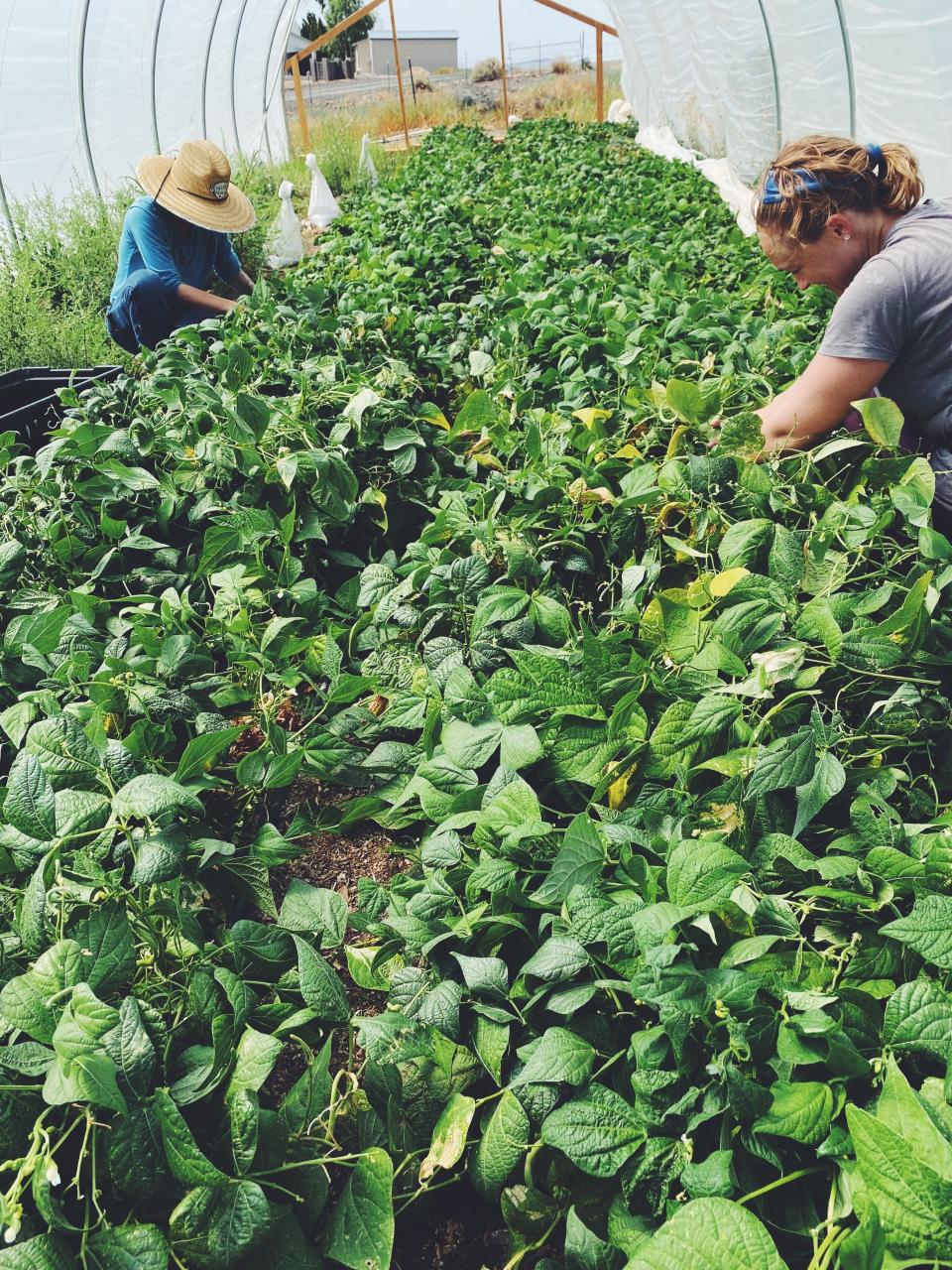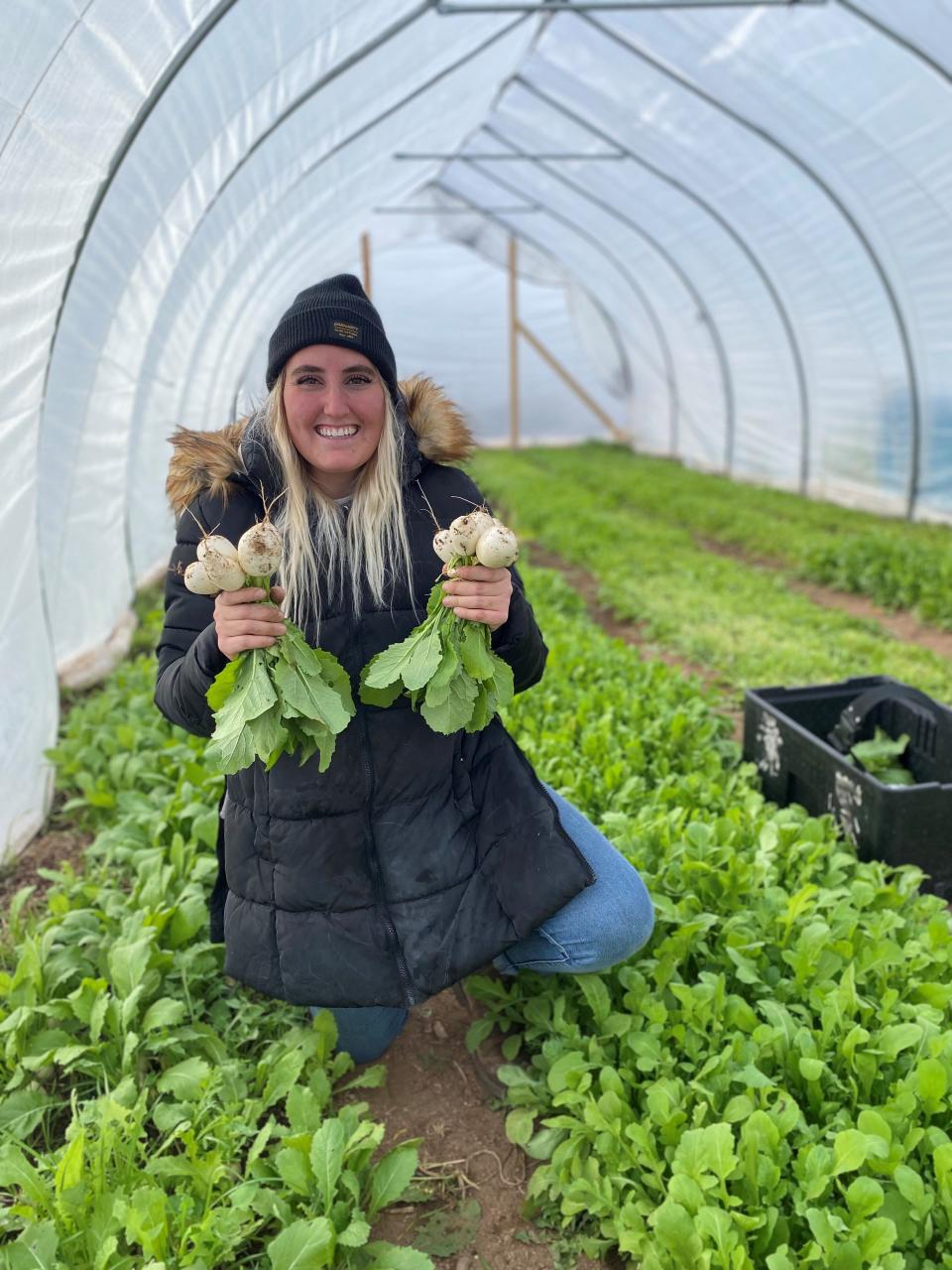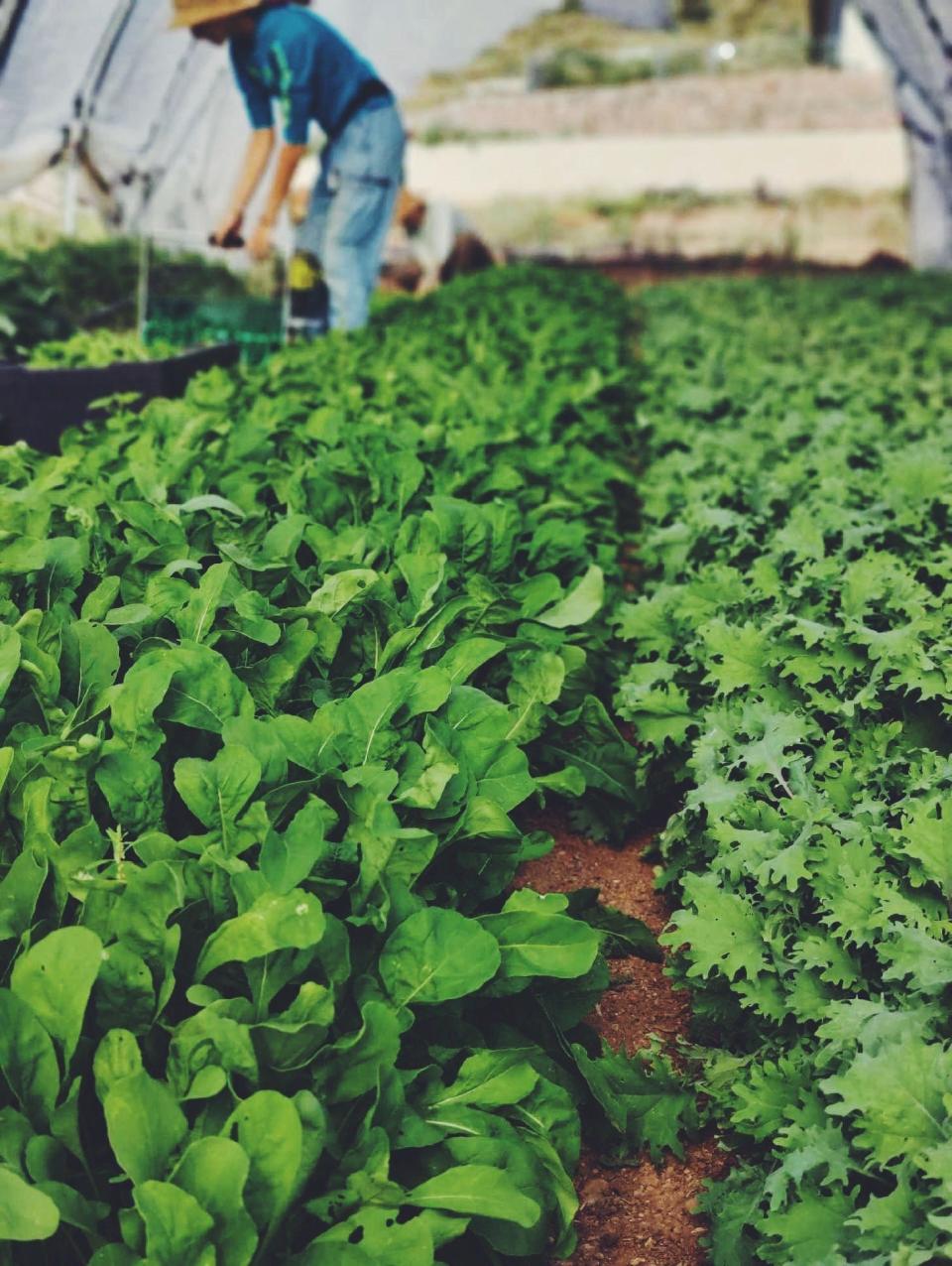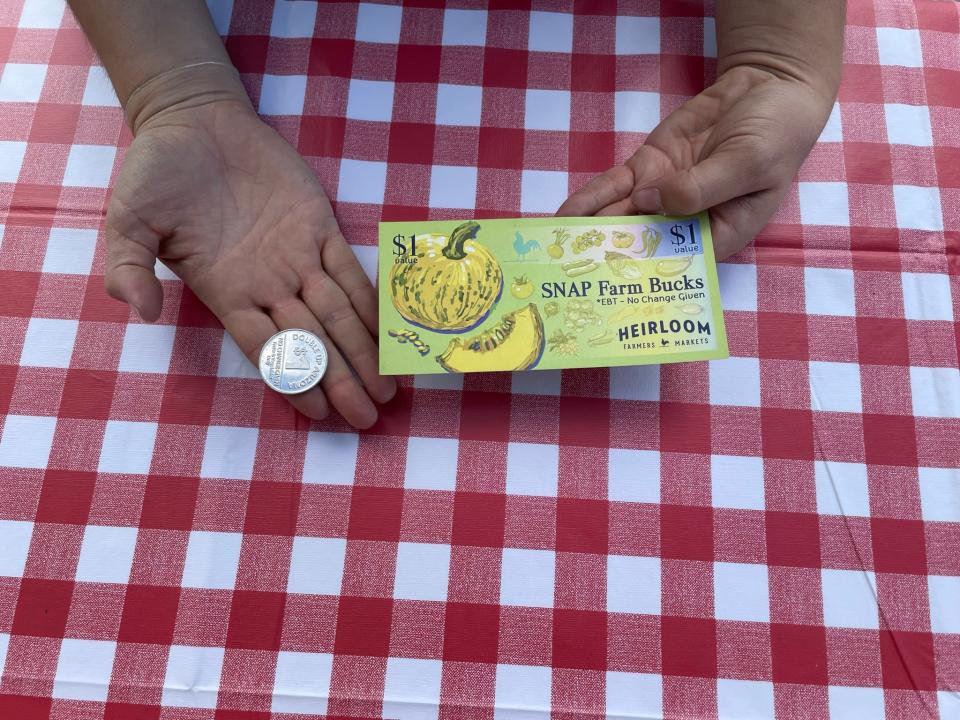Online payments help SNAP customers put more farm-grown food on their tables. Here's how
Grocery delivery has been an option for many Arizonans for several years — except if they count on federal nutrition assistance to pay for their family's food needs.
Even when COVID-19 restrictions hit, it took months before big supermarkets accepted online payments from people using SNAP, formerly known as the food stamp program. Farmers’ markets, producers and cooperatives selling pre-ordered food boxes, which became critical in 2020 to meet local food needs, were also not options for online SNAP transactions.
That changed this year with a small farm in Kingman.
Rosebird Farms, owned by Andrea McAdow, is the first farm business in Arizona authorized by the U.S. Department of Agriculture to accept SNAP payments online.

The change will allow customers in Kingman, Golden Valley, Valle Vista, Lake Havasu and Flagstaff to pay for and receive food boxes ordered from their homes. Rosebird Farms already offered delivery, but SNAP cardholders had to make all payments at the store, a one-hour drive for some, McAdow said.
“It's an equity issue,” said Elyse Guidas, executive director of Activate Food Arizona, a nonprofit that works for better access to healthy, affordable food in the state, and helped McAdow get USDA approval for the new service.
Many people have the opportunity to make "an abundance of choices" when it comes to food, like what, when, where and how to shop, said Guidas. For families living on a low income, affordability is not the only challenge. Work schedules, lack of transportation, mobility challenges or caring for a family member can make access to healthy food even harder.
“There are some SNAP customers who can't go in person, and that will continue to be the case whether or not the pandemic is here or not," she said.
Currently, about 13% of Arizonans, or 467,827 households total, receive SNAP, according to Department of Economic Security statistics for March 2024.
The new technology is just one more way of increasing access to healthy food for people who don't have it, said Guidas, who also runs a mobile fruit and vegetable market.

With grant money from Vitalyst Health Foundation, Activate Food Arizona is still working with three more farmers and local food retailers to help them get authorized to receive online SNAP payments. The process is costly and complex, but the work done with Rosebird Farms helped lift some hurdles, like the software development.
“It's hard work because no one's doing it right now," Guidas said. "But I envision a situation where Arizona retailers also have equity in how they want to diversify their businesses and reach new customers.”
A new local food hub in Kingman
McAdow moved to Kingman about six years ago.
As a Massachusetts transplant and civil engineer by training, she was new not only to farming but to farming in the desert. Yet she wanted to grow food for her family and figured she could try doing so for her new town too.
Self-taught, she started small, growing a backyard garden, selling at a farmers’ market and helping other farmers sell their produce.

Then she became co-owner of West of 3rd and added a growing produce section to the women-owned “sustainable lifestyle boutique.” She wanted to create a "community of small businesses and growers who can rely on each other" and share a market.
Rosebird Farms, officially registered in 2019, now produces certified naturally grown veggies, greens and flowers on a one-acre plot, and employs six people. McAdow also runs a Community Supported Agriculture program, a subscription for pre-ordered boxes of local food, with products from about 20 local farmers and ranchers.
Some 225 people from Flagstaff to Lake Havasu are signed up for the weekly food boxes.
"It's blossomed into something where people can get pretty much their full line of groceries from us, if that's what they want to do," she said.
Julia Petrosius is one of those people.
The fresh produce, greens, meat, butter and cheese she gets from West of 3rd supplies about 90% of her family food needs, she said, and “it’s a blessing.”
“We include them in our prayers every night over our dinner. I'm not kidding," said Petrosius, a Kingman homesteader, mixed martial arts coach, and mother of four kids.
About two years ago, Petrosius and her boyfriend, who uses a wheelchair, decided to apply for nutrition assistance. Jobs were hard to find, and they were struggling to make ends meet, she said. With those benefits, they buy fresh, locally grown food. Eggs and milk come from her own animals.
“It makes me feel so much better putting dinner on the table," she said. "To know that I'm helping my kids build good habits while they're young, so they don't struggle when they're older.”

Bigger incentives with local food purchases
Buying local produce can give people with SNAP twice the credits.
Double Up Food Bucks, a fruit and vegetable incentive program, doubles the value of SNAP dollars when they are spent at "local food marketplaces." Big retail stores are not included, even if they offer SNAP online payments. Rosebird Farms and its shop now offer both. It's the only store in Kingman with that perk.
On average, households enrolled in SNAP receive about $360 monthly.
“If it wasn't for West of 3rd and what they are doing, our SNAP benefits would not even cover two weeks out of the month,” Petrosius said. “We would be buying lots of boxed, canned, and bagged food."
For Petrosius those choices make a difference. Based on the premise that "health is wealth," she made big changes in her eating habits some seven years ago: "when I was constantly sick and tired of being sick and tired," she said.
She could tell the impact of those changes even down to her mood and her kids' mood, she said. "The better I ate, the better I felt."
“I would like people to know that good, real food is available,” she said. “They don't need to sacrifice health for how much (money) is coming in.”
New software will help bring more sellers
Activate Food Arizona is still working to get more retailers on SNAP online, including Blue Sky Organics in Litchfield Park, Pivot Produce in southern Arizona, and Sun Produce Cooperative in Maricopa County.
Norm's Hometown Grocery, a shop in Kearny from the Independent Grocers Alliance, is the only other small retailer offering the service.
Going online is still a big challenge for small shops. The process is complex, with upfront costs and big-time investments. Retailers must create full, updated online inventories with quality photos, sort out the e-commerce software, and create a certified PIN-entry payment. There are also annual and transaction costs.
The upside is that the way is now partially paved.
The nonprofit made a one-time investment to develop special software called Local Food Marketplace, which meets USDA Food and Nutrition Services' requirements. Rosebird Farms is the first to use it and get government approval.
"Any future retailer using this platform automatically meets all of FNS's operational requirements to become a SNAP Internet Retailer," said Katie O'Neill, the project leader.
There are still costs to using this or other e-commerce platforms. The team is calculating the "true cost" to small retailers with input from Rosebird Farms, Guidas said.
SNAP online could also increase purchase reliability for producers.
Unlike big retail shops, small growers offering a CSA, or "food box," depend on customers making a subscription ahead of time, certifying that what is grown and bagged will be paid for. People using debit or credit cards can pay when they file their orders, but SNAP customers have to make those payments in person, which means losses for the sellers if they cancel or postpone pickup.
Sometimes things go wrong and people don't come for their orders, said Sun Produce president Cindy Gentry. "We then get stuck with paying the farmer for the bag and having to figure out something to do with the produce that has been ordered."
"It's not a healthy bottom line."
Individuals using SNAP could make an online payment when they place their order for food bags, giving Sun Produce guarantees of pickup. The coop does not offer delivery but could find partners to make that option available, Gentry said.
"We want to increase local food access, we want the farmers to be successful, and we have to have a business model that is sustainable," she added.
Clara Migoya covers agriculture and water issues for The Arizona Republic and azcentral. Send tips or questions to clara.migoya@arizonarepublic.com.
You can support local journalism in Arizona by subscribing to azcentral.
This article originally appeared on Arizona Republic: Online payment system helps SNAP users buy more farm-grown food
